高中英语北师大版必修四 Unit 12 Culture Shock 教学辅导 课件(59张)
文档属性
| 名称 | 高中英语北师大版必修四 Unit 12 Culture Shock 教学辅导 课件(59张) |

|
|
| 格式 | zip | ||
| 文件大小 | 2.0MB | ||
| 资源类型 | 教案 | ||
| 版本资源 | 北师大版 | ||
| 科目 | 英语 | ||
| 更新时间 | 2016-09-18 00:00:00 | ||
图片预览


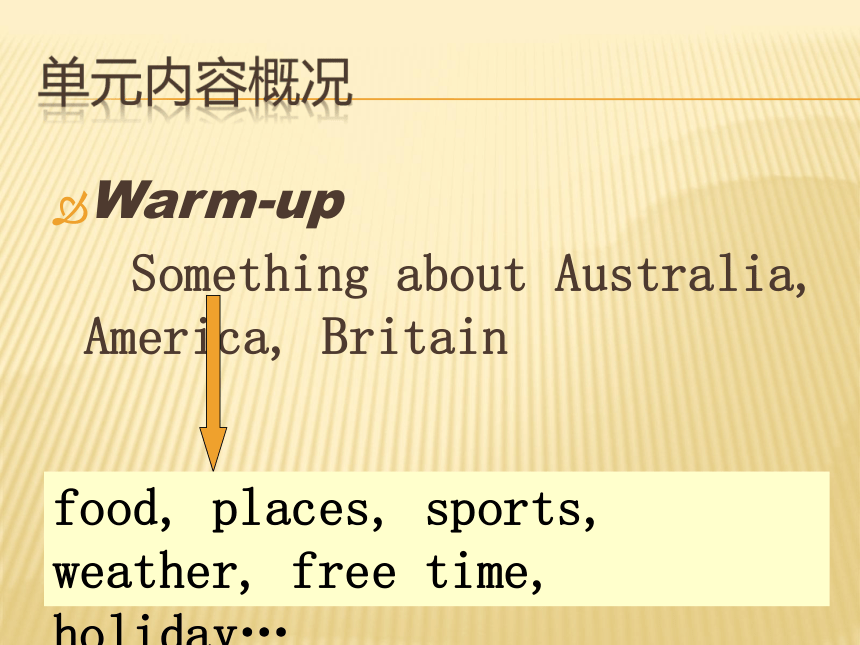
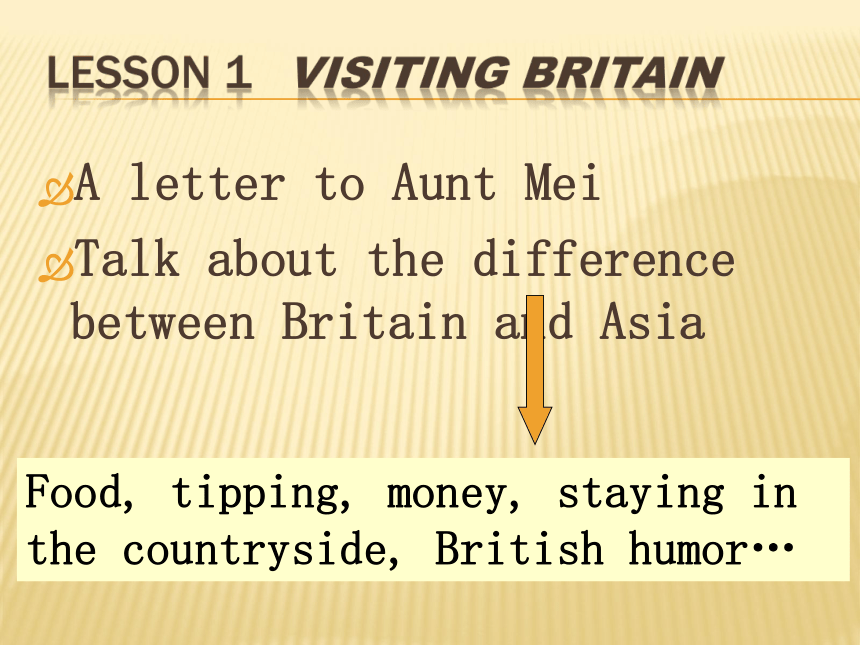
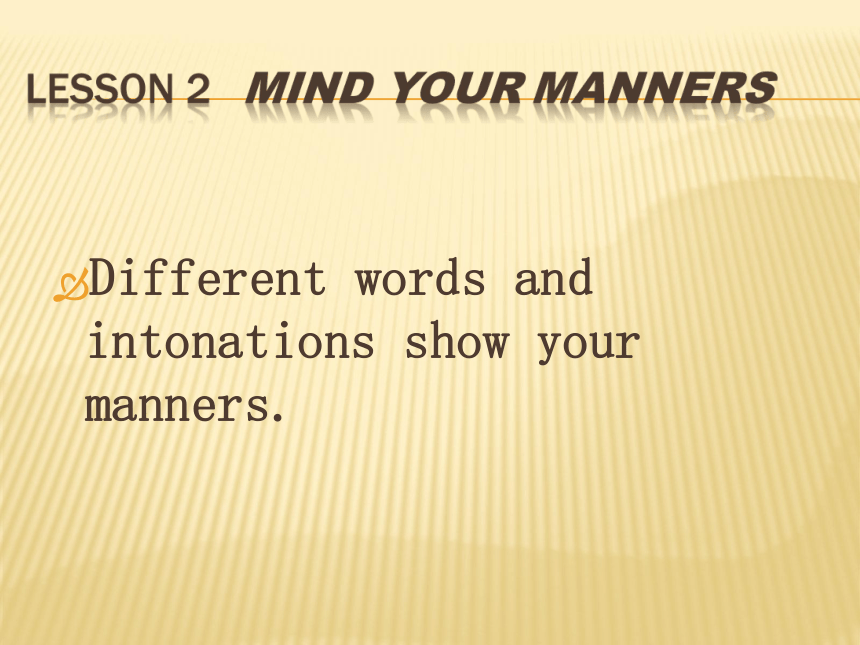
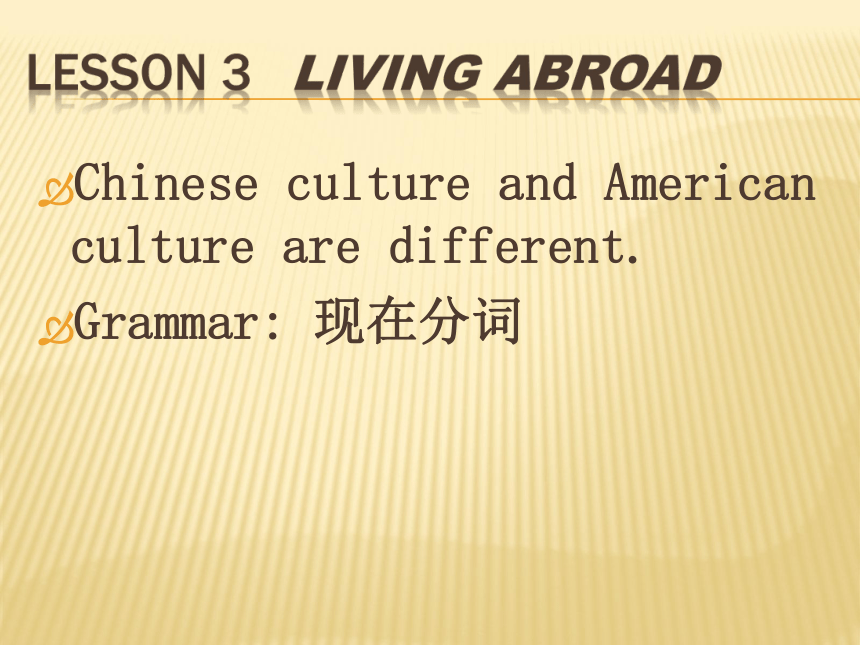
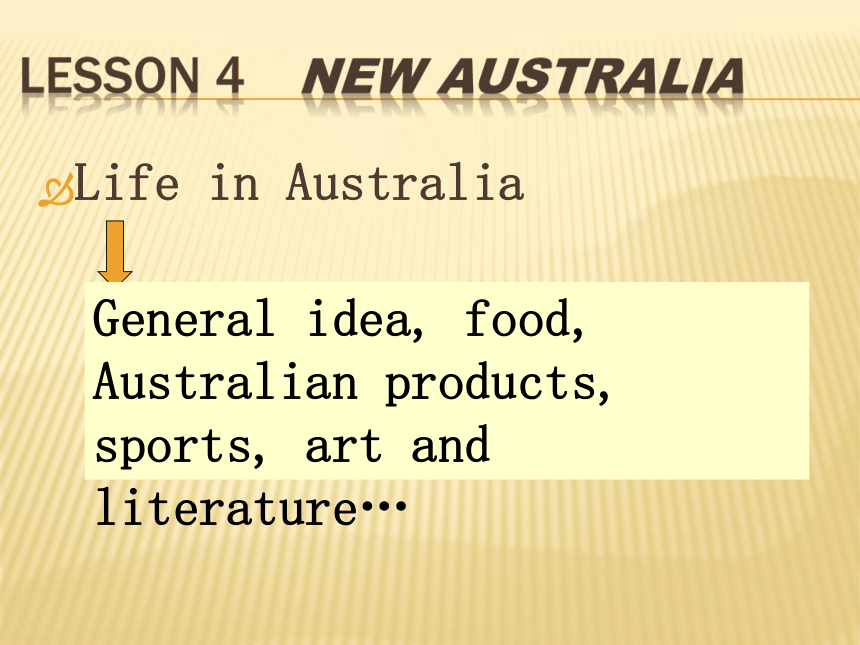
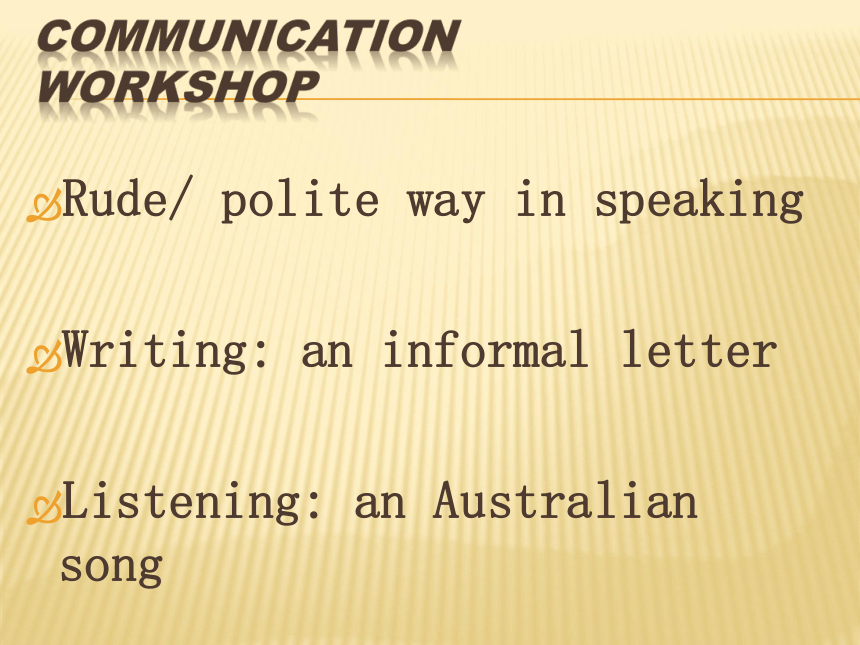

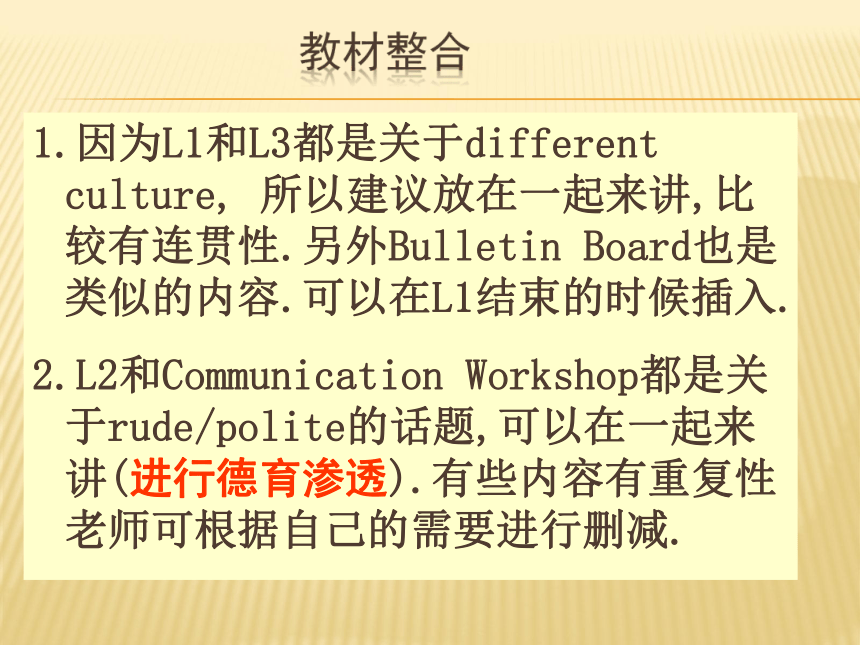
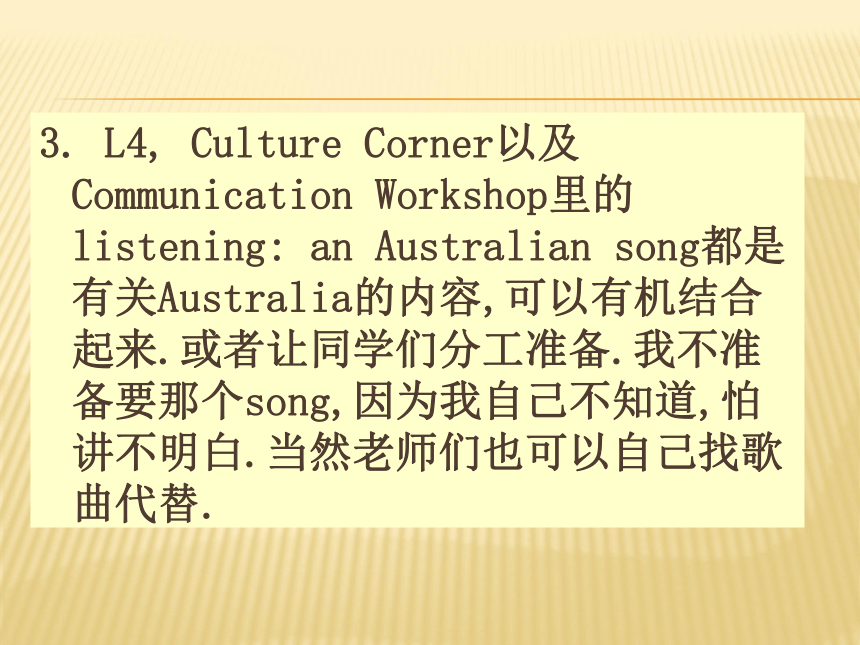
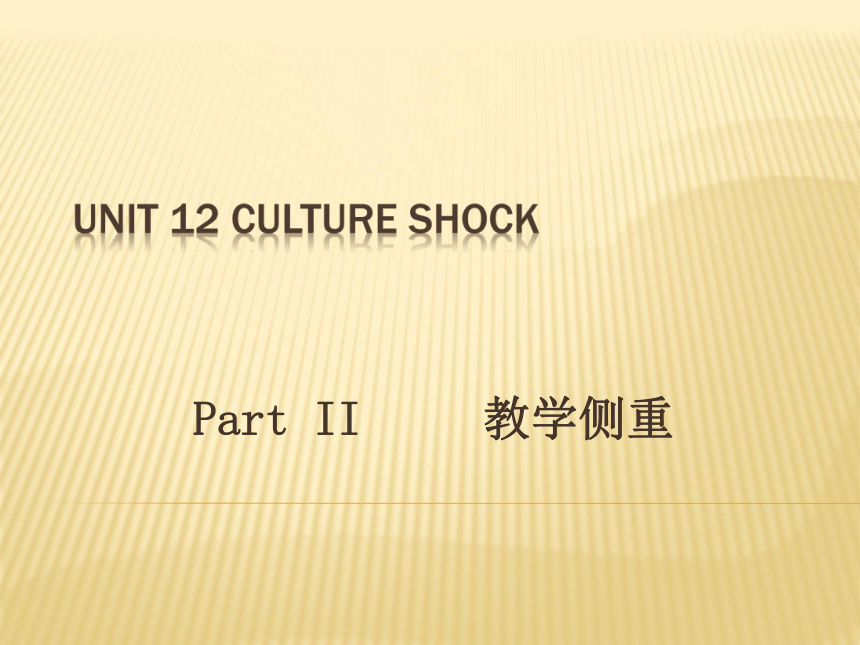
文档简介
课件59张PPT。Unit 12 Culture Shock教学辅导
Unit 12 Culture ShockPart I 教学设想
单元内容概况Warm-up
Something about Australia, America, Britainfood, places, sports, weather, free time, holiday…Lesson 1 Visiting Britain A letter to Aunt Mei
Talk about the difference between Britain and AsiaFood, tipping, money, staying in the countryside, British humor…Lesson 2 Mind Your MannersDifferent words and intonations show your manners.Lesson 3 Living AbroadChinese culture and American culture are different.
Grammar: 现在分词Lesson 4 New AustraliaLife in AustraliaGeneral idea, food, Australian products, sports, art and literature… Communication WorkshopRude/ polite way in speaking
Writing: an informal letter
Listening: an Australian songCulture CornerThe native Australians教材整合1.因为L1和L3都是关于different culture, 所以建议放在一起来讲,比较有连贯性.另外Bulletin Board也是类似的内容.可以在L1结束的时候插入.
2.L2和Communication Workshop都是关于rude/polite的话题,可以在一起来讲(进行德育渗透).有些内容有重复性老师可根据自己的需要进行删减.3. L4, Culture Corner以及Communication Workshop里的listening: an Australian song都是有关Australia的内容,可以有机结合起来.或者让同学们分工准备.我不准备要那个song,因为我自己不知道,怕讲不明白.当然老师们也可以自己找歌曲代替.Unit 12 Culture ShockPart II 教学侧重教学侧重侧重话题Culture Shock,所以L1和L3是阅读重点.其中的重点词汇也要讲.包括其中的语法都应该是讲解重点.
L4和Culture Corner都是对Australia的了解,可以作为泛读,作为一种文化背景知识的了解.
L2和Communication Workshop是生活中的实际运用,应该是讲的少,让同学们练的多.Lesson 3
Living AbroadFree-talk (1)Go China Go
As a Chinese, you must be proud of it. Tell us your reasons.
For Example:
I am proud of being a Chinese because there is / are … in China.Free-talk (2)If you have the chance to go to USA, would you like to go there? Why or why not?
For example:
I want to go to USA because I want to see…
I don’t want to go there because I don’t like…Culture ShockIf you were in USA, what would be your big difficulty in understanding American Culture?
Have you experienced any funny story happening to a foreigner who has just arrived in China?Discuss the following situations:1. After dinner, your friend is going to leave your home. What will you do to show your politeness?
2. How can we behave politely when we eat in a restaurant?
3. You wear a beautiful dress and your friend says it is good on you. What will you say then?Say goodbye, walk the friend to the station, and welcome him / her to visit you next time Chat happily and enjoy the food
Keep on putting more food in the guest’s bowlBe shy and say it is cheap Read the textsRead the texts and find out the differences between Chinese and American culture.say goodbye, go back to the room, close the door whisper to each other
not give more food if the guest doesn’t ask for moreFeel happy, say thanks 1.Jin Li found the American way of life familiar soon after he arrival in the USA.2. We know Jin Li has at least one American friend.3. Wang Lei never went back to the restaurant in New York again.NITNIRead for detailsTrue ( T ), false ( F ) or no information ( NI )?4.Martin stayed in China with a local family.
5. Tom couldn’t understand why his friend’s grandfather wanted to go with him to the bus station.6. Tina was a friend of the tourist guide.FTNI
Voice your opinion !What do you think are most important to you if you have a chance to visit a city for the first time, its place, its food or its architecture?Find the words in the texts which meet / match the following1. liking to meet and talk to new people2. a desire for food3. speak very quietly4. partoutgoingto have an appetitewhisperaspect6. tasty7. excellent8. look at something for a long time
without moving your eyesyummysplendidstare5. carefulcautiousLanguage points
have a …time (in) doing something
sound like
insist on doing sth.
stare at
1. 表示动作正在进行。非谓语动词中的现在分词主要起形容词和副词的作用, 在句中作定语、表语、补语或状语。
一. 现在分词的两个基本特点:主动,进行。Grammar boiling water 沸水
boiled water 白开水,
rising sun 冉冉升起的太阳。
risen sun 升起的太阳例如: a developing country.
一个发展中的国家a developed country 一个发达国家2. 表示逻辑主动。
例如: the ruling class 统治阶级,
the ruled class 被统治阶级
the exploiting class 剥削阶级
the exploited class 被剥削阶级二. 掌握现在分词的基本功能。1. 现在分词作定语, 表示正在进行的或主动的动作。也可以说明被修饰词的性质和特征, 此时可换成相应的定语从句。例如: ???? 分析: B 。表示正在进行的动作,句意是:正在飞的鸟。此处的 a flying bird = a bird which was flying 。 He saw a ___ bird and raised his bow.
A. fly B. flying
C. flew D. to be flying 分析:B 表示被修饰词 speech 的性质和特征, 此处的 the exciting speech = the speech that/which was exciting 。 I was satisfied with the _____ speech.
? A. excite B. exciting
??C. excited D. be excited 2. 现在分词作补足语, 表示正在进行的或主动的动作。① Soon they could see the steam ___ from the wet clothes. A. rise B. rising C. risen D. be rising 分析: B 句意: 很快他们看见蒸汽从湿衣服上升起。rising 现在分词作宾语补足语,表示正在进行的动作。 ② The missing boys were last seen ___ near the river. (NMET 1994)
A. playing B. to be playing
C. play D. to play ? 分析: A 句意:失踪的男孩们最后被看到时是他们正在河边玩耍。现在分词作主语补足语。 3. 现在分词作状语时,可作时间、条件、结果、原因、让步、方式和伴随状语, 表示正在进行的或主动的动作。此时分词的逻辑主语就是主句的主语, 因此要注意人称、时态和语态的一致性。① The visiting minister expressed his satisfaction with the talks, ______ that he had enjoyed his stay here. (1994)
???? A. having added B. to add
???? C. adding D. added ???分析: C 句意:来访的大臣表示了对谈判的满意,同时又补充说道他呆在这里很愉快。 adding 作伴随状语,表示主动的动作。所以应用现在分词作伴随状语。可以转化为一个并列句 ② European football is played in more than 80 countries, ___ it the most popular sport in the world. (1998)
??? A. making B. makes
C. made D. to make 分析: A 句意:欧式足球在 80 多个国家开展,其结果是它使欧式足球成为世界上最受欢迎的体育运动。 making 是现在分词作结果状语。现在分词做结果状语,通常表示一个自然的,意料中的结果;不定式做结果状语,则表示出乎意料的结果,前面常用only强调这一意外结果。His parents died, __________him
an orphan.She hurried to the train station,
only _________that the train had
left ten minutes before.他的父母死了,留下他成了孤儿。她匆匆赶到火车站,却发现火车已经离开了十分钟了。leavingto find③ _____ from the top of the hill, we can find that the city looks more beautiful. A. Seeing B. Seen C. Saw D. To be seeing 分析: A seeing 的逻辑主语就是主句的主语 we, 表示正在进行的主动动作。 当我在街上走时,我看到他了. When/While?I?was?walking?in?the?street,
I?saw?him.? Walking?in?the?street, I?saw?him. When/While?walking?in?the?street, I?saw
?him. 现在分词作时间状语 如果你努力工作的话,你就会获得成功。 If you work hard, you’ll succeed.? Working?hard, you?will?succeed.? 现在分词作条件状语? Work hard, and you’ll succeed. 由于她病了,她呆在了家里。 Because she was ill, she stayed at home. Being?ill, she?stayed?at?home. 现在分词作原因状语? 尽管他已经失败了许多次,他并没有灰心。Though he has failed many times, he didn’t
lose his heart.Having?failed?many?times, he?didn't?lose
his?heart.? 现在分词作让步状语? Please?answer?the?question?using?another
?way.? 作方式状语当他在街上走时,我看到他了 When/While?he?was?walking?in?the?street,
I?saw?him.? Walking?in?the?street, I?saw?him. ( ) F He?walking?in?the?street, I?saw?him. 独立主格,又叫独立结构。它没有主语
和谓语,只有逻辑上的主语,因此,它在
句法上不是句子,而是一个独立于句子成
分之外的独特结构形式。? (选讲)独立主格结构可分为两部分,一部分是
名词或代词(主格),起着逻辑主语的
作用;另一部分由形容词、副词、名词、
分词、不定式、介词短语等构成,表示
前面名词或代词的状态、状况或动作。? 在句中作状语 要注意它不是句子 ? 其实我们曾经学过的”with的复合结构”
是差不多的 只不过它要比独立主格多
个with.? 4. 现在分词的独立主格结构作状语。With his lips still _____, he couldn’t say a word.
A. trembling B. tremble
C. to tremble D. to be trembling ? 分析: A 。句意:他说不出话,因为他的嘴唇在颤动。这里需要用现在分词的独立主格结构作原因状语, 表示正在进行的动作。“We can’t go out in this weather,” said Bob, _____out of the window.
Looking B. to look
C. Looked D. having looked
2. A cook will be immediately fired if he is found ____ in the kitchen.
smoke B. smoking
C. to smoke D. smoked
A.LookingB. smoking3. Suddenly, a tall man driving a golden carriage _____ the girl and took her away , ___into the woods.
A. seizing; disappeared
B. seized; disappeared
C. seizing; disappearing
D. seized; disappearingD. seized; disappearing4.He looked around and caught a man _____his hand into the pocket of a passenger.
put B. to be putting
C. to put D. puttingD. puttingUnit 12Communication WorkshopInformal & FormalYeah, sure, Ok, thanks…
Would you mind…, please, thank you…Imagine you are on an exchange visit to the UK. Have a conversation over dinner with one of the parents of your exchange partner. You need something on the table- ask for it
You broke something earlier in the day- apologise
Ask for a favour, e.g. a lift into town
You want to do something with your exchange partner at the weekend – ask for permissionListening 1Listen to four short dialogues. Which ones are formal and which are informal?
Informal:1/4
Formal:2/3Listening 2What does the student ask for?
What favour does he ask for?
Why does he apologise?
What does he want to do on Saturday night?SaltTo be collected from class tomorrowBecause he broke a glass in the bathroomGo out with a friend and have a door key so he can come back lateListening 3When he asks to be collected from school
When he asks for a key because he is going to be out lateWriting: An informal letter
Unit 12 Culture ShockPart I 教学设想
单元内容概况Warm-up
Something about Australia, America, Britainfood, places, sports, weather, free time, holiday…Lesson 1 Visiting Britain A letter to Aunt Mei
Talk about the difference between Britain and AsiaFood, tipping, money, staying in the countryside, British humor…Lesson 2 Mind Your MannersDifferent words and intonations show your manners.Lesson 3 Living AbroadChinese culture and American culture are different.
Grammar: 现在分词Lesson 4 New AustraliaLife in AustraliaGeneral idea, food, Australian products, sports, art and literature… Communication WorkshopRude/ polite way in speaking
Writing: an informal letter
Listening: an Australian songCulture CornerThe native Australians教材整合1.因为L1和L3都是关于different culture, 所以建议放在一起来讲,比较有连贯性.另外Bulletin Board也是类似的内容.可以在L1结束的时候插入.
2.L2和Communication Workshop都是关于rude/polite的话题,可以在一起来讲(进行德育渗透).有些内容有重复性老师可根据自己的需要进行删减.3. L4, Culture Corner以及Communication Workshop里的listening: an Australian song都是有关Australia的内容,可以有机结合起来.或者让同学们分工准备.我不准备要那个song,因为我自己不知道,怕讲不明白.当然老师们也可以自己找歌曲代替.Unit 12 Culture ShockPart II 教学侧重教学侧重侧重话题Culture Shock,所以L1和L3是阅读重点.其中的重点词汇也要讲.包括其中的语法都应该是讲解重点.
L4和Culture Corner都是对Australia的了解,可以作为泛读,作为一种文化背景知识的了解.
L2和Communication Workshop是生活中的实际运用,应该是讲的少,让同学们练的多.Lesson 3
Living AbroadFree-talk (1)Go China Go
As a Chinese, you must be proud of it. Tell us your reasons.
For Example:
I am proud of being a Chinese because there is / are … in China.Free-talk (2)If you have the chance to go to USA, would you like to go there? Why or why not?
For example:
I want to go to USA because I want to see…
I don’t want to go there because I don’t like…Culture ShockIf you were in USA, what would be your big difficulty in understanding American Culture?
Have you experienced any funny story happening to a foreigner who has just arrived in China?Discuss the following situations:1. After dinner, your friend is going to leave your home. What will you do to show your politeness?
2. How can we behave politely when we eat in a restaurant?
3. You wear a beautiful dress and your friend says it is good on you. What will you say then?Say goodbye, walk the friend to the station, and welcome him / her to visit you next time Chat happily and enjoy the food
Keep on putting more food in the guest’s bowlBe shy and say it is cheap Read the textsRead the texts and find out the differences between Chinese and American culture.say goodbye, go back to the room, close the door whisper to each other
not give more food if the guest doesn’t ask for moreFeel happy, say thanks 1.Jin Li found the American way of life familiar soon after he arrival in the USA.2. We know Jin Li has at least one American friend.3. Wang Lei never went back to the restaurant in New York again.NITNIRead for detailsTrue ( T ), false ( F ) or no information ( NI )?4.Martin stayed in China with a local family.
5. Tom couldn’t understand why his friend’s grandfather wanted to go with him to the bus station.6. Tina was a friend of the tourist guide.FTNI
Voice your opinion !What do you think are most important to you if you have a chance to visit a city for the first time, its place, its food or its architecture?Find the words in the texts which meet / match the following1. liking to meet and talk to new people2. a desire for food3. speak very quietly4. partoutgoingto have an appetitewhisperaspect6. tasty7. excellent8. look at something for a long time
without moving your eyesyummysplendidstare5. carefulcautiousLanguage points
have a …time (in) doing something
sound like
insist on doing sth.
stare at
1. 表示动作正在进行。非谓语动词中的现在分词主要起形容词和副词的作用, 在句中作定语、表语、补语或状语。
一. 现在分词的两个基本特点:主动,进行。Grammar boiling water 沸水
boiled water 白开水,
rising sun 冉冉升起的太阳。
risen sun 升起的太阳例如: a developing country.
一个发展中的国家a developed country 一个发达国家2. 表示逻辑主动。
例如: the ruling class 统治阶级,
the ruled class 被统治阶级
the exploiting class 剥削阶级
the exploited class 被剥削阶级二. 掌握现在分词的基本功能。1. 现在分词作定语, 表示正在进行的或主动的动作。也可以说明被修饰词的性质和特征, 此时可换成相应的定语从句。例如: ???? 分析: B 。表示正在进行的动作,句意是:正在飞的鸟。此处的 a flying bird = a bird which was flying 。 He saw a ___ bird and raised his bow.
A. fly B. flying
C. flew D. to be flying 分析:B 表示被修饰词 speech 的性质和特征, 此处的 the exciting speech = the speech that/which was exciting 。 I was satisfied with the _____ speech.
? A. excite B. exciting
??C. excited D. be excited 2. 现在分词作补足语, 表示正在进行的或主动的动作。① Soon they could see the steam ___ from the wet clothes. A. rise B. rising C. risen D. be rising 分析: B 句意: 很快他们看见蒸汽从湿衣服上升起。rising 现在分词作宾语补足语,表示正在进行的动作。 ② The missing boys were last seen ___ near the river. (NMET 1994)
A. playing B. to be playing
C. play D. to play ? 分析: A 句意:失踪的男孩们最后被看到时是他们正在河边玩耍。现在分词作主语补足语。 3. 现在分词作状语时,可作时间、条件、结果、原因、让步、方式和伴随状语, 表示正在进行的或主动的动作。此时分词的逻辑主语就是主句的主语, 因此要注意人称、时态和语态的一致性。① The visiting minister expressed his satisfaction with the talks, ______ that he had enjoyed his stay here. (1994)
???? A. having added B. to add
???? C. adding D. added ???分析: C 句意:来访的大臣表示了对谈判的满意,同时又补充说道他呆在这里很愉快。 adding 作伴随状语,表示主动的动作。所以应用现在分词作伴随状语。可以转化为一个并列句 ② European football is played in more than 80 countries, ___ it the most popular sport in the world. (1998)
??? A. making B. makes
C. made D. to make 分析: A 句意:欧式足球在 80 多个国家开展,其结果是它使欧式足球成为世界上最受欢迎的体育运动。 making 是现在分词作结果状语。现在分词做结果状语,通常表示一个自然的,意料中的结果;不定式做结果状语,则表示出乎意料的结果,前面常用only强调这一意外结果。His parents died, __________him
an orphan.She hurried to the train station,
only _________that the train had
left ten minutes before.他的父母死了,留下他成了孤儿。她匆匆赶到火车站,却发现火车已经离开了十分钟了。leavingto find③ _____ from the top of the hill, we can find that the city looks more beautiful. A. Seeing B. Seen C. Saw D. To be seeing 分析: A seeing 的逻辑主语就是主句的主语 we, 表示正在进行的主动动作。 当我在街上走时,我看到他了. When/While?I?was?walking?in?the?street,
I?saw?him.? Walking?in?the?street, I?saw?him. When/While?walking?in?the?street, I?saw
?him. 现在分词作时间状语 如果你努力工作的话,你就会获得成功。 If you work hard, you’ll succeed.? Working?hard, you?will?succeed.? 现在分词作条件状语? Work hard, and you’ll succeed. 由于她病了,她呆在了家里。 Because she was ill, she stayed at home. Being?ill, she?stayed?at?home. 现在分词作原因状语? 尽管他已经失败了许多次,他并没有灰心。Though he has failed many times, he didn’t
lose his heart.Having?failed?many?times, he?didn't?lose
his?heart.? 现在分词作让步状语? Please?answer?the?question?using?another
?way.? 作方式状语当他在街上走时,我看到他了 When/While?he?was?walking?in?the?street,
I?saw?him.? Walking?in?the?street, I?saw?him. ( ) F He?walking?in?the?street, I?saw?him. 独立主格,又叫独立结构。它没有主语
和谓语,只有逻辑上的主语,因此,它在
句法上不是句子,而是一个独立于句子成
分之外的独特结构形式。? (选讲)独立主格结构可分为两部分,一部分是
名词或代词(主格),起着逻辑主语的
作用;另一部分由形容词、副词、名词、
分词、不定式、介词短语等构成,表示
前面名词或代词的状态、状况或动作。? 在句中作状语 要注意它不是句子 ? 其实我们曾经学过的”with的复合结构”
是差不多的 只不过它要比独立主格多
个with.? 4. 现在分词的独立主格结构作状语。With his lips still _____, he couldn’t say a word.
A. trembling B. tremble
C. to tremble D. to be trembling ? 分析: A 。句意:他说不出话,因为他的嘴唇在颤动。这里需要用现在分词的独立主格结构作原因状语, 表示正在进行的动作。“We can’t go out in this weather,” said Bob, _____out of the window.
Looking B. to look
C. Looked D. having looked
2. A cook will be immediately fired if he is found ____ in the kitchen.
smoke B. smoking
C. to smoke D. smoked
A.LookingB. smoking3. Suddenly, a tall man driving a golden carriage _____ the girl and took her away , ___into the woods.
A. seizing; disappeared
B. seized; disappeared
C. seizing; disappearing
D. seized; disappearingD. seized; disappearing4.He looked around and caught a man _____his hand into the pocket of a passenger.
put B. to be putting
C. to put D. puttingD. puttingUnit 12Communication WorkshopInformal & FormalYeah, sure, Ok, thanks…
Would you mind…, please, thank you…Imagine you are on an exchange visit to the UK. Have a conversation over dinner with one of the parents of your exchange partner. You need something on the table- ask for it
You broke something earlier in the day- apologise
Ask for a favour, e.g. a lift into town
You want to do something with your exchange partner at the weekend – ask for permissionListening 1Listen to four short dialogues. Which ones are formal and which are informal?
Informal:1/4
Formal:2/3Listening 2What does the student ask for?
What favour does he ask for?
Why does he apologise?
What does he want to do on Saturday night?SaltTo be collected from class tomorrowBecause he broke a glass in the bathroomGo out with a friend and have a door key so he can come back lateListening 3When he asks to be collected from school
When he asks for a key because he is going to be out lateWriting: An informal letter
